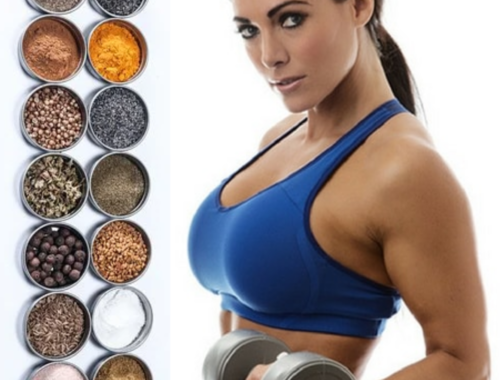
10 NUTRITIONAL SUPPLEMENTS TO BUILD MUSCLE MASS
Contents
Developing muscles requires the right amount of food to be consumed at regular intervals throughout the day. We can also supplement ourselves intelligently to supplement our diet.
I always recommend a minimum of one gram of protein per half kilogram of body weight, enough complex carbohydrates and healthy fats.
The muscle building machine needs to be turned on every three hours with a meal or supplement. The right calories from carbohydrates and fats will optimize the hormonal environment with proper rest and recovery. Get your blood tested, optimize your hormones and train smartly.
But when it comes to supplements to build mass, we must find the combinations that work together.
- Why mix supplements that are counterproductive?
- Why take a fat burner if you’re trying to build mass?
- Why take two supplements that do the same thing?
We must take high quality supplements that really work. If you choose a supplement from a dubious brand, you may end up with a low-dose product or even something toxic. Choose wisely, consider the following supplements to build mass to its maximum by increasing its levels in the cells.

1 WHEY PROTEIN
Whey protein is rich in branched chain amino acids, and is rapidly digested and absorbed. As discussed above, whey is endowed with leucine, a very important amino acid, key to ignite protein synthesis through the mTOR pathway.
Gram to gram, due to its high concentration of leucine, the serum is more adept at building muscle than soy, casein or wheat protein. Most bodybuilders optimize muscle protein synthesis with 3 to 4 grams of leucine per meal. This would suggest that consuming 30 to 40 grams of whey protein helps build mass. Combining whey protein with an equivalent amount of carbohydrate after training ignites the mTOR pathway through leucine and a concomitant insulin boost. Serum protein supplements are the best way to build mass.
2 HMB (BETA-HYDROXY-BETA-METHYLBUTYRATE)
To build mass you must not only turn on muscle growth, but you must also prevent muscle degradation. Intense training degrades the muscles, in the hope that a good recovery will build more muscles than you had when you started. HMB or beta-hydroxy-beta-methylbutyrate is a metabolite of the amino acid leucine that is particularly good at preventing muscle breakdown.
Three grams per day, in my opinion, should be part of your intense training program.
HMB stimulates protein synthesis in up to 70% (leucine does this in up to 110%) but at the same time it decreases muscle degradation by 57%. Recent studies have suggested that HMB is a form of free acid that can be absorbed more quickly and may be even more effective than the calcium form HMB.
A recent study was conducted in mice to look at the absorption kinetics and bioavailability of free acid HMB versus calcium HMB (sold by Abbott). The Abbott Nutrition Research and Development study suggests that their product, calcium HMB reaches higher levels of plasma concentration and clears more slowly than HMB-free acid.
To find out if one is more effective than another in building muscle, a placebo-controlled study would have to be conducted without as much bias or partiality on the part of the researchers.
3 PHOSPHATIDIC ACID (PA)
Phosphatidic acid (PA) is a component of cell membranes. The mechanical contraction of muscle stimulates enzymes that bind phosphatidicoline PA in the cell membranes, increasing its levels in the cells. PA can ignite the mTOR pathway through a separate domain of growth factors such as IGF-1 or the amino acid leucine.
Therefore, it is thought that PA can act synergistically with leucine to stimulate muscle growth. In a recent study with muscle cell cultures it was shown that soy-derived PA was incredibly powerful in activating mTOR. Follow-up studies, where a 750ml dose of PA was ingested versus a placebo for 8 weeks of endurance exercise showed significant improvements in the group taking the PA. These subjects gained more muscle mass, had greater muscle girth and more strength. This supplementation needs to be studied in combination with serum protein and HMB.
4 CREATINE
Leucine, HMB, and creatine, are very powerful in building and maintaining muscle; a recent study explored their effects on muscle cell cultures. The scientists showed that these three components can prevent the actions of the muscle growth inhibitor myostatin.
Previous studies have shown that creatine reduces myostatin levels and stimulates the conversion of testosterone into the more potent hormone dihydrotestosterone (DHT).
The DHT elevation was almost 60% higher with 25 grams per day as the loading phase for one week, and remained 40% higher for another 7 days with a maintenance dose of 5 grams per day.
Creatine is clearly a performance-enhancing supplement and is one of the most researched of all sports nutrition products. There are many versions of creatine, but creatine monohydrate appears to be the most consistent and effective.
Normally 5 grams are consumed four times a day for 7 days and then maintained at 5 grams per day. Contrary to popular belief, you do not need periods of «creatine rest» unless you have explosive bowel habits. In that case, your partner may ask you to take a break.
5 BETA ALANINE
Intense training develops the muscles. There are many supplements that help you improve your performance in the gym and take your limits to another level. Beta alanine is a supplement that helps you train harder, especially when combined with creatine.
Beta-alanine supplementation is the most effective way to raise muscle carnosine levels. Carnosine regulates acids in the muscles, improves contraction strength and reduces fatigue.
Much evidence suggests that beta-alanine supplementation increases total work performed, output strength, physical capacity, and fatigue threshold. Four high-quality studies demonstrated an increase in lean mass in beta alanine treated groups compared to a placebo group. A study recently published in the scientific journal of the American College of Sports Medicine suggests that -1.2 grams of beta alanine per day was optimal for maintaining up to 50% more muscle carnosine levels than the baseline, after a six-week loading phase of 3.2 per day.

6 CITRULLINE/ARGININE
Citrulline can be produced in the gastrointestinal tract from glutamine or by the release of arginine nitric oxide (NO). When citrulline is absorbed, it removes lactate and ammonium from the blood through the conversion of arginine in the kidneys. In this way, citrulline raises arginine levels in the blood. This increases your ability to produce nitric oxide. The malate in «citrulline malate» supplements is also an energy intermediate that can increase ATP production.
Studies have shown that citrulline malate can increase the duration of a training session and mitigate late-onset pain. In one study conducted with weightlifters, 8 grams of citrulline malate 60 minutes before training produced significant improvements in the number of repetitions in hack squats, leg presses, and leg extensions until failure.
The same dose of citrulline malate was shown, in another study, to improve performance and recovery. Don’t forget that green vegetables and beets are the best source of nitrates for the production of nitric oxide.
7 MELATONINE
The next two supplements are actually hormones. Melatonin is a hormone secreted by the pineal gland in circadian rhythm to trigger the physiology of sleep. Melatonin supplementation has the ability to improve deep sleep, because during this phase the body goes through restorative processes to recover after training and also releases growth hormone.
Research has shown that 5 ml of melatonin supplementation can improve growth hormone levels. In addition to its many metabolic and antioxidant effects, melatonin taken at night may be beneficial for the bodybuilder seeking to further increase muscle mass. Sleep should not be neglected for optimal recovery after training.
8 VITAMIN D
Vitamin D is a hormone made from cholesterol as well as testosterone. Vitamin D activates a nuclear receptor such as anabolic steroids. We must think of it as a «vital» hormone. Its function goes far beyond simply improving the absorption of calcium in the bones.
Multiple studies have shown the importance of vitamin D supplementation to improve strength, especially in older adults who are deficient in this vitamin. High levels of vitamin D in the blood are associated with muscle cell contractility, strength, and postural stability. Vitamin D deficiency is associated with insulin resistance and metabolic dysfunction. Supplementing the diet with vitamin D at a dose of 1000 to 2000 IU per day may improve the action of leucine and insulin in promoting protein synthesis in muscle.
9 ANABOLIC FATS
Despite the belief that fats are harmful to health, science is finally beginning to accept the concept that fats are an essential macronutrient. Limiting their consumption for fear of cardiovascular disease has led to the vilification that any fat other than fish is bad. The reality is that fats come in different shapes and sizes with different effects on our metabolism. Trans fats or hydrogenated oils are metabolically toxic and should be avoided.
It has been suggested that arachidonic acid may be a pro-inflammatory Omega 6 acid that could be harmful to health. In fact, arachidonic acid has important metabolic functions such as endogenous mediators that produce muscle growth.
Arachidonic acid derivatives activate mTOR in a similar way as leucine does. In addition, essential fatty acids, including fish oil, are important mediators of repair and recovery after exercise. Don’t believe the lie of the «low fat diet», eat plenty of healthy fats, fish and grass-fed beef.
10 CAFFEINE
Caffeine is the component of every pre-workout supplement par excellence. Many designer stimulators have come and gone, but caffeine is here to stay. A large cup of coffee has enough caffeine (330 mg) and antioxidants to stimulate your workout at the gym. Studies suggest that caffeine limits the perception of fatigue, improves focus, and aids in muscle recovery.
* Remember, you must choose your supplements wisely. Look for recognized and reliable brands, avoid inaccurate labels. More doesn’t always mean better. The supplements I have listed here are my favorites; however there are many others, some with more or less studies to back them up.

SIX TIPS TO BURN FAT SAFELY AND EFFECTIVELY
También te puede interesar

THE BEST EXERCISES FOR GLUTES
febrero 9, 2021
THE BEST EXERCISES BY MUSCLE GROUPS FOR BIKINI FITNESS ATHLETES
diciembre 11, 2020
